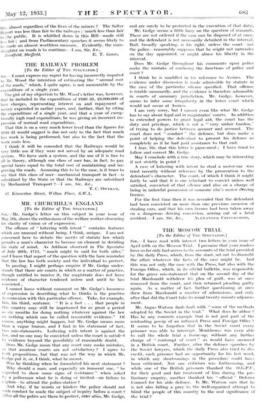THE MOSCOW TRIAL [To the Editor of THE SPECTATOR.] SIR,—I
have read with interest two letters' in your issue of April 23th on the Moscow Trial. I presume that your readers have so far only had access to the accounts of the trial provided by the daily Press, which, from the start, set out to discredit the affair whatever the facts of the ease might be. And this was not only the case with the Press, but also with the
Foreign Office, which, in its of bulletin, was responsible for the grave mis-statement that on the second day of the' trial Macdonald withdrew his plea of guilt, was at once removed from the court, and then returned pleading guilty again. As a matter of fact, further questioning at once drew from Macdonald a number of admissions, and only after that did the Court take its usual twenty-minute adjourn- ment.
Mr. Angus Watson finds fault with " some of the methods. adopted by the Soviet in the trial." What does he abhor Has he any concrete example that is not just part of the misleading gossip of an inflamed Press and Foreign Office? It seems to be forgotten that in the Soviet court every. prisoner was able to interrupt, Monkhouse was CVell able to call the whole trial a frame-up, without any further. charge of " contempt of court" as would have occurred in a British court.. Further, after the defence speeches by the Soviet lawyers, which the daily Press also tried to dis- credit, each prisoner had an opportunity for his last word, in which any shortcomings in the procedure could have been criticized. Not one criticism was forthcoming, and while one of the British prisoners thanked the 0.G.P.U.
for their good and fair treatment of him during the pre- liminary enquiry, another thanked his " official " Defence
Counsel for his able defence. Is Mr. Watson sure that he is not also falling a prey to the well-organized attempt to blind the people of this country -to the real significance of the trial ? Mr. W. F. Pelton writes "that every man is innocent 'Until he has been toroved to be guilty." Had he read throngh the concluding speech of the SoViet Public Prosecutor he 'would see that in cases of the bribery of public servants and espionage such a principle explicitly does not exist in British law, and the Soviet law and the British law on these matters closely resemble each other. The Public Prosecutor _quoted at length from British statutory law on the matter ; but his speech was dragged in the mud by almost all the Press, as if it had been a mere orgy of vituperation, whereas in fact it was a highly polished analysis of the ins and outs of the case, showing a knowledge not only of Soviet, but of British law.
In his concluding speech the Public Prosecutor was also careful to anticipate such dogmatic statements as that of the Editor of The Spectator, who states that "The standards of justice are undoubtedly higher in England than in Russia." His detailed analysis of certain recent British political cases, the case of the Meerut prisoners in India, and others, was completely ignored by the British Press, and apparently The Spectator also is no better informed than the common herd of journalists.
, The detailed report of the trial is now on sale in this country in three volumes, and it is to be hoped that all those who are interested in this case will peruse the facts, and compare them with the versions dished up by the Foreign Office and the daily papers.—I am, Sir, &c., [(1) The facts regarding Mr. Macdonald's attitude before and after his removal from court were stated in The Spectator of April 28th. (2) In their- costly cable messages it was obviously, impossible for the correspondents at Moscow to send more than a skeleton summary of -M. Vishinsky's lengthy speech. (3) The question of whether standards of justice are higher in. England or in Russia is a matter of opinion, -on which -The Spectator sees no reason to change the views it has already expressed. (4) The Spectator makes no claim to information that is not available to "the common herd of journalists."—En. The Spectator.]

































 Previous page
Previous page